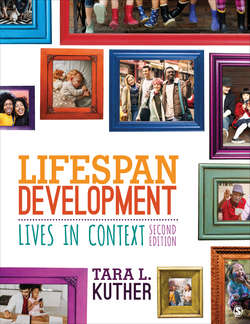Читать книгу Lifespan Development - Tara L. Kuther - Страница 211
На сайте Литреса книга снята с продажи.
Experience and Brain Development
ОглавлениеStimulation and experience are key components needed to maximize neural connections and brain development throughout life, but especially in infancy. Much of what we know about brain development comes from studying animals. Animals raised in stimulating environments with many toys and companions to play with develop brains that are heavier and have more synapses than do those who grow up in standard laboratory conditions (Berardi, Sale, & Maffei, 2015). Likewise, when animals raised in stimulating environments are moved to unstimulating standard laboratory conditions, their brains lose neural connections. This is true for humans, too. Infants who are understimulated, such as those who experience child maltreatment or who are reared in deprivation, such as in poor understaffed orphanages in foreign countries, show deficits in brain volume as well as cognitive and perceptual deficiencies that may persist into adolescence (Hodel et al., 2015; C. A. Nelson et al., 2016; Sheridan & McLaughlin, 2014). In this way, infancy is said to be a sensitive period for brain development, a period in which experience had a particularly powerful role (Hensch, 2018).
The powerful role that experience plays in brain development can be categorized into two types. First, the brain depends on experiencing certain basic events and stimuli at key points in time to develop normally (Bick & Nelson, 2017); this is referred to as experience-expectant brain development. Experience-expectant brain development is demonstrated in sensory deprivation research with animals. If animals are blindfolded and prevented from using their visual system for the first several weeks after birth, they never acquire normal vision because the connections among the neurons that transmit sensory information from the eyes to the visual cortex fail to develop; instead, they decay (DiPietro, 2000; Neville & Bavelier, 2001). If only one eye is prevented from seeing, the animal will be able to see well with one eye but will not develop binocular vision, the ability to focus two eyes together on a single object. Similarly, human infants born with a congenital cataract in one eye (an opaque clouding that blocks light from reaching the retina) will lose the capacity to process visual stimuli in the affected eye if they do not receive treatment. Even with treatment, subtle differences in facial processing may remain (Maurer, 2017). Deprivation of sound has similar effects on the auditory cortex (Mowery, Kotak, & Sanes, 2016). Brain organization depends on experiencing certain ordinary events early in life, such as opportunities to hear language, see the world, touch objects, and explore the environment (Kolb, Mychasiuk, & Gibb, 2014; Maurer & Lewis, 2013). All infants around the world need these basic experiences to develop normally, and it is difficult to repair errors that are the result of severe deprivation and neglect (Berardi et al., 2015; McLaughlin, Sheridan, & Nelson, 2017).
A second type of development, experience-dependent brain development, refers to the growth that occurs in response to learning experiences (Bick & Nelson, 2017). For example, experiences such as learning to stack blocks or crawl on a slippery wood floor are unique to individual infants, and they influence what particular brain areas and functions are developed and reinforced. Experience-dependent development is the result of lifelong experiences that vary by individual based on contextual and cultural circumstances (Kolb et al., 2014; Stiles & Jernigan, 2010). Exposure to enriching experiences, such as interactive play with toy cars and other objects that move; hands-on play with blocks, balls, and cups; and stimulating face-to-face play can all enhance children’s development (Kolb, 2018). For example, a longitudinal study that followed more than 350 infants from 5 to 24 months of age found that the quality of mother–infant interactions at 5 months predicted greater brain activity in the prefrontal cortex at 10 and 24 months of age, suggesting that parenting quality may contribute to brain development in infancy (Bernier, Calkins, & Bell, 2016). One the other hand, exposure to deprivation and trauma can have lasting negative effects on brain development (Harker, 2018).
